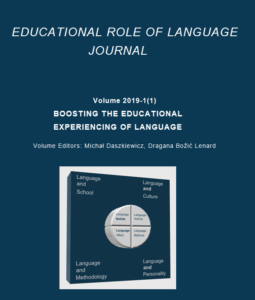Zenta Anspoka, Inese Eglite 
University of Latvia, Latvia; https://orcid.org/0000-0002-5431-9602, https://orcid.org/0000-0003-4906-3400
DOI: https://doi.org/10.36534/erlj.2019.01.02
Bibliographic citation: (ISSN 2657-9774) Educational Role of Language Journal. Volume 2019-1(1). Boosting the Educational Experiencing of Language, pp. 16-22
Abstract
The topicality of the research relates to the problem that in the last ten or more years approximately 300 thousand Latvian people live outside Latvia. Together with parents are living children in more than 15 countries. One of the tasks with national importance is to help to children and their family to save or to develop Latvian language and culture traditions, to give possibility to return to Latvia and to continue education process in Latvia. Latvian Language State Agency provides an opportunity to learn Latvian as a State language and to get acquainted with Latvian culture traditions, to understand social events, relationships in the society. One of possibility for this is to plan and to realize integrated content and language learning and teaching process for children outside Latvia in a digital class. That means to use Classflow site and another digital tools (Skype, a mobile phone and toys with special computer software, interactive blackboard programs etc.). Aim of the study is to analyze the experience of children living outside Latvia to learn integrated content and language with digital tools. Research is based on analyses of theories about content and language integrated learning, communicative approach for language acquirement and teacher’s professional competence. Empirical research is based on pedagogical observation and teacher’s survey results. As respondents are 120 children (6-14 year old) in 22 groups/digital classes and 16 teachers.
Keywords: digital class as a work organization form, content and language integrated learning (CLIL), teacher’s professional competence
Go to full Volume 2019-1(1)
Go to Educational Role of Language Journal – main page
Go to International Association for the Educational Role of Language – main page